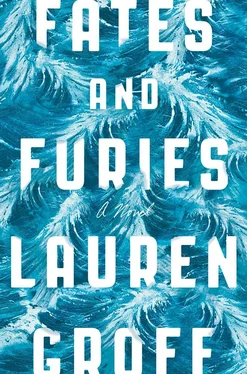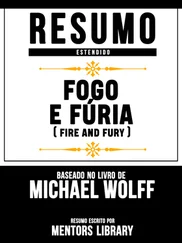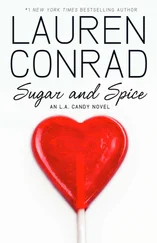He put his fork down and looked at her. “Oh, please, Aurélie. You weren’t beaten. You weren’t starved. You go to school and the dentist and the doctor. I had none of those things. You are being melodramatic. This isn’t Oliver Twist , you are not some child in a coal mine. I have been kind to you.”
“Blacking factory. Dickens worked in a blacking factory,” she said. She switched to English. “No, I wouldn’t say you have never been unkind.”
He sensed the insult better than he understood it. “No matter. I am all you ever would have had. Diablesse , they called you. I must say, I have seen no evidence of your devil, to my disappointment. Either it’s not there, or you have learned to dissimulate as all good devils do.”
“Perhaps living in fear can drive all devils out of a person,” she said. “Exorcism by terror.” She drank her water and poured wine to the top of the glass and drank it down.
“You have witnessed nothing you should fear,” he said. He leaned forward and smiled. “I could change that if you prefer.”
For a moment, she stopped breathing. Perhaps it was the wine that made her vision swim. “No, thank you,” she said.
“You are welcome,” he said. He finished the salad, wiped his mouth, and said, “Nobody has told you that your parents have new babies. New, well. Relatively. One is three and one is five. Little boys. Your brothers, I suppose. I’d show you the photo my sister sent, but I seem to have lost it.”
[Strange how things are associated with their particular pains: Caesar salad forever a suffocating sadness.]
She smiled at a spot above her uncle’s head, where the firelight reflected off an antique barometer. It also shined through his pointed ears. She said nothing.
He said, when the filet came, “You are very tall. Skinny. Odd-looking, which seems fashionable. You could be a model, perhaps. Even put yourself through college.”
She drank her water in slow and even sips.
“Ah,” he said. “You thought I was going to send you to college. But my obligation ends at eighteen.”
“You could afford it,” she said.
“I could,” he said. “But I’m interested in watching what you’ll do. Struggle forms character. No struggle, no character. Nobody gave me a thing in my life,” he said. “Not one thing. I earned it all.”
“And look at you now,” she said.
He smiled at her and the resemblance to her grandmother, her long-ago mother, absent all warmth, made her skin prickle. “Be careful,” he said.
The untouched meat on her plate became fuzzy and slowly cleared. “Why do you hate me?” she said.
“Oh, child. I have no feelings about you whatsoever,” he said; this was the kindest thing he would ever say to her.
He slurped down a panna cotta . There was cream in the folds of his mouth.
The check arrived and a man came up to her uncle and shook his hand, murmuring in his ear, and Mathilde gratefully turned away because, from the corner of her eye, she caught a slight movement in the doorway. A white cat had inserted its head into the room and was pulling its taut body on its forepaws, staring fixedly into the woodpile. Tiny tiger, hunting. For some time, she was lulled by the cat’s immobility, only the tiny twitch at the end of the tail to signal life; and then, without warning, the cat leapt. When it turned, a soft, boneless, gray thing hung in its mouth. A field mouse, Mathilde thought. The cat trotted off, its tail jaunty with pride. When she turned back to her uncle and his friend, they were looking at her, amused.
“Dmitri just said that you are the cat. The cat is you,” the uncle said.
No. She had always hated cats. They seemed so full of rage. She put her napkin on the table and smiled with all her teeth.
THE ONLY ONE WHO RETURNED and returned and returned was Rachel.
Rachel made soup and focaccia, which Mathilde fed to the dog.
Rachel returned alone, with Elizabeth, with the children, who ran in the fields with God until the dog collapsed, and then combed all the tufts and brambles out of her fur and left her lax and panting for hours afterward.
“I don’t want to see you,” Mathilde shouted at Rachel when she came alone one morning with cheese danishes and fresh juice. “Go away.”
“Abuse me all you want,” Rachel said. She put the pastries down on the mat and stood again, fierce in the dim morning light. That god-awful tattoo up her arm, all spiderweb and mermaid and a little turnip, some sort of bondage fantasia or, at the very least, a mixed metaphor. The family had a talent for figurative knots. Rachel said: “I won’t go away. I’ll come back again and again and again until you’re well.”
“I’m warning you,” Mathilde said, through the glass door. “I’m the worst person you know.”
“That is untrue,” Rachel said. “You are one of the kindest, most generous people I’ve ever met. You’re my sister and I love you.”
“Ha. You don’t know me,” Mathilde said.
“But I do,” Rachel said. She laughed, and though all her life Mathilde had felt a sort of sorrow that Rachel was nothing like her brother, so great and shining, now she saw Lotto in his little sister’s face, the same semi-dimple in the cheek, the strong teeth. Mathilde shut her eyes and locked the door. Even still, with her endless nervous energy, Rachel came back and she came back and she came back.
—
SHE’D FALLEN ASLEEP in the pool house. Six months after Lotto died, grim heat of August. Their old friend Samuel had come that morning to remonstrate, nostrils flaring, and she’d waited him out in the pool house while he circled the house, bellowing her name.
Oh, little Samuel! she thought, listening. Kind son of a corrupt senator father. It had become a joke, unbelievable, the trials of Samuel, the DUIs, the divorces, the cancer, the house he’d burned down in his thirties. The racist a year ago who’d found Sam walking home at night from a movie and beat him to concussion. Not the smartest or the bravest, but he’d been born with preternatural confidence. Job was just a whiner compared with him.
Samuel was gone when she woke. Her skin was glazed in sweat. Her mouth was sandpaper and tar and she thought of the berries waiting on the countertop for her, the pie she could already taste. Butter, zest, essence of summer, salt. She heard another car turn onto the gravel. God was barking in the kitchen. She came across the too-bright grass and into the house and up the stairs to see from her bedroom who had arrived. Even the tiger lilies Mathilde had cut for herself seemed to be sweating.
A young person stepped out of an inexpensive little car: some kind of Hyundai or Kia. Rental. City boy. Boy, well. Thirty or thereabouts. Alone so long, Mathilde had taken to thinking of herself as wizened, ancient. To see herself in the mirror was to see the shock of unexpected youth.
There was something about this person’s loose-limbed walk across the drive that held her. He was medium-sized, dark-haired, handsome with his long eyelashes and defined jaw. Something whirred in her chest uncomfortably, which she had come to recognize in the past months as a strange chimera of rage and lust. Well! Only one way to exorcise it! She sniffed her armpits. They’d do.
She startled when she saw that the boy was looking up at her in the window as he came up to the door: she had taken to wearing Lotto’s white T-shirts and had sweated through this one so it was transparent, her nipples saying a double hello. She pulled on a tunic and descended and opened the door to the boy. God snuffled at his shoes, and he knelt and petted her. When he stood to shake Mathilde’s hand, his palm was covered with a fine layer of dog down and was clammy beneath. When he touched her, he burst into tears.
Читать дальше












